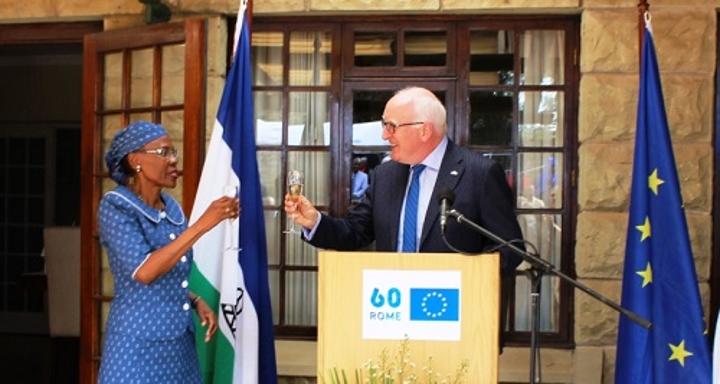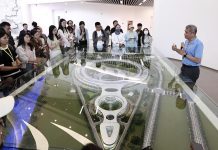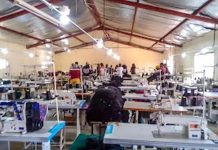Africa-Press – Lesotho. European Union (EU) Ambassador to Lesotho Dr Michael Doyle says the bloc of countries is still committed to the development of the country through grants and projects but would like to see more commitment from the Lesotho side in terms of adhering to the principles of the Reforms Pledge, signed by most registered political parties.
The pledged, witnessed by various national and international stakeholders and partners, was signed in Maseru on April 6 2017 under the banner, ‘Commitment by Lesotho’s Political Parties to an Inclusive, Participatory and Comprehensive Reforms Process’.
Ambassador Doyle was officiating at the occasion to celebrate Europe Day 2017 at the EU residency in Maseru last week Tuesday. He expressed the need of holding of a national dialogue by all stakeholders in the country’s political mainstream before the elections.
And to assure the EU that Lesotho was committed to its citizenry, Foreign Affairs Minister ‘Mamphono Khaketla responded, saying the Government of Lesotho was unreservedly going to the principles of social justice and human development, even as the country is headed towards the snap election to choose the next government on June 3.
In reply Doyle said, “Evidence of such concrete progress with the dialogue and reforms process should allow government and other stakeholders to in turn focus also on the critical economic agenda, not least the creation of real jobs for Basotho.
”
The EU-Lesotho development corporation work has been taking place at various levels over the past 41 years and according to Doyle, the EU’s programme of financial and technical co-operation supports the implementation of Lesotho’s own ‘National Strategic Development Plan’ (NSDP).
“Our current European Development Programme (EDF 11) – which is jointly managed with the Ministry of Finance and which focuses on the three agreed priority sectors of Water, Energy and Governance – runs until 2020.
We are currently engaged with the Government in the Mid-Term Review (MTR) process for EDF 11. “This Mid-Term Review takes into account past performance by Lesotho, the adoption of the SDG’s, and the current political realities in Lesotho as well as in Europe.
At this stage it’s too soon to know what will be the final outcome of this review process,” the ambassador said. Recently, the EU has been working with Lesotho, particularly in the area of renewable energy and other green energy sources such as wind, hydro and solar power. Earlier this year, the EU announced support of 7 million Euros (around M100 million Maloti) to help Lesotho to reform its energy sector.
“I am pleased to announce that just two weeks ago, we launched a Call for Proposals in the Energy sector – we are hopeful that we will receive sound proposals and can select and fund good projects that will enable more households and small enterprises, especially those in the rural areas who are off the main grid, to have access to alternative sources of energy, while also promoting energy efficiency and conservation practices in the country,” said Doyle.
In the water sector, the EU has been supporting government over the last year to develop a sound framework for launching a critical programme of Integrated Catchment Management (ICM), which will be essential to ensuring the long-term sustainability of water resources, particularly in the highlands, and the potential for agricultural production throughout Lesotho.
He also said the EU continued to provide technical advisory support to the government in the critical area of Public Financial Management (PFM) Reform for which the final report of the 2016 ‘Public Expenditure and Financial Accountability’ (PEFA) assessment for Lesotho was presented recently.
“While this report highlights many serious deficiencies in PFM, it also serves as a very helpful benchmarking basis from which to urgently move forward with the critical reforms needed to ensure better management of public finances and indeed donor investments,” Doyle said.
“Apart from the funds mobilised under the 11th EDF, the European Union through its humanitarian aid budget mobilised an extra 5.5 million Euros (around 78 million Maloti) to help mitigate the impact of the El Nino induced drought and help the most vulnerable households in Lesotho.
He added that the ‘Economic Partnership Agreement’ (EPA) between the EU and the southern SADC countries, which was signed and then ratified in the second half of 2016, provides Lesotho with very important opportunities in areas of trade and development, particularly in such areas as the wool and mohair industries, where significant added-value income and much needed rural employment opportunities could be generated.
For More News And Analysis About Lesotho Follow Africa-Press






